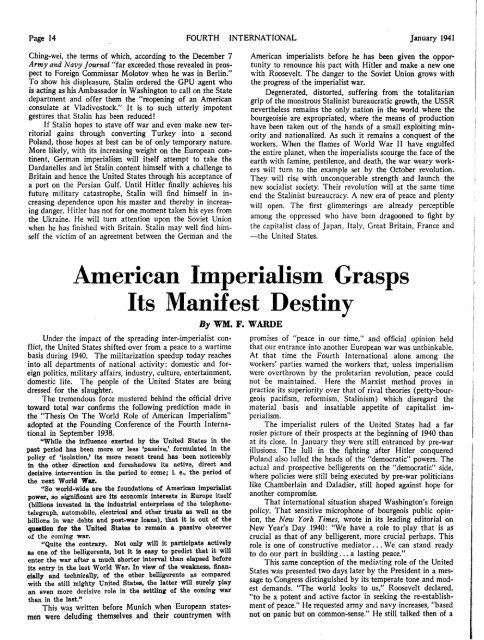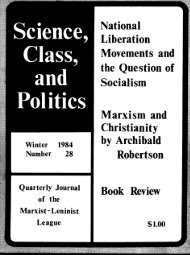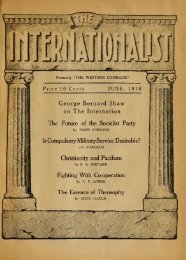January 1941 - Marxists Internet Archive
January 1941 - Marxists Internet Archive
January 1941 - Marxists Internet Archive
Create successful ePaper yourself
Turn your PDF publications into a flip-book with our unique Google optimized e-Paper software.
Page 14 FOURTH INTERNATIONAL <strong>January</strong> <strong>1941</strong><br />
Ching-wei, the terms of which, according to the December 7<br />
Army and Navy Journal "far exceeded those revealed in prospect<br />
to Foreign Commissar Molotov when he was in Berlin."<br />
To show his displeasure, Stalin ordered the GPU agent who<br />
is acting as his Ambassador in Washington to call on the State<br />
department and offer them the "reopening of an American<br />
consulate at Vladivostock." It is to such utterly impotent<br />
gestures that Stalin has been reduced!<br />
If Stalin hopes to stave off war and even make new territorial<br />
gains through converting Turkey into a second<br />
Poland, those hopes at best can be of only temporary nature.<br />
More likely, with its increasing weight on the European continent,<br />
German imperialism will itself attempt to take the<br />
Dardanelles and let Stalin content himself with a challenge to<br />
Britain and hence the United States through his acceptance of<br />
a port on the Persian Gulf. Until Hitler finally achieves his<br />
future military catastrophe, Stalin will find himself in increasing<br />
dependence upon his master and thereby in increasing<br />
danger. Hitler has not for one moment taken his eyes from<br />
the Ukraine. He will turn attention upon the Soviet Union<br />
when he has finished with Britain. Stalin may well find himself<br />
the victim of an agreement between the German and the<br />
American imperialists before he has been given the opportunity<br />
to renounce his pact with Hitler and make a new one<br />
with Roosevelt. The danger to the Soviet Union grows with<br />
the progress of the imperialist war.<br />
Degenerated, distorted, suffering from the totalitarian<br />
grip of the monstrous Stalinist bureaucratic growth, the USSR<br />
nevertheless remains the only nation in the world where the<br />
bourgeoisie are expropriated, where the means of production<br />
have been taken out of the hands of a small exploiting minority<br />
and nationalized. As such it remains a conquest of the<br />
workers. When the flames of World War II have engulfed<br />
the entire planet, when the imperialists scourge the face of the<br />
earth with famine, pestilence, and death, the war weary workers<br />
will turn to the example set by the October revolution.<br />
They will rise with unconquerable strength and launch the<br />
new socialist society. Their revolution will at the same time<br />
end the Stalinist bureaucracy. A new era of peace and plenty<br />
will open. The first glimmerings are already perceptible<br />
among the oppressed who have been dragooned to fight by<br />
the capitalist class of Japan, Italy, Great Britain, France and<br />
-the United States.<br />
American Imperialism Grasps<br />
Its Manifest Destiny<br />
By WM. F. WARDE<br />
Under the impact of the spreading inter-imperialist conflict,<br />
the United States shifted over from a peace to a wartime<br />
basis during 1940. The militarization speedup today reaches<br />
into all departments of national activity: domestic and foreign<br />
politics, military affairs, industry, culture, entertainment,<br />
domestic life. The people of the United States are being<br />
dressed for the slaughter.<br />
The tremendous force mustered behind the official drive<br />
toward total war confirms the following prediction made in<br />
the "Thesis On The World Role of American Imperialism'·<br />
adopted at the Founding Conference of the Fourth International<br />
in September 1938.<br />
"While the influence exerted by the United States in the<br />
past period has been more or less 'passive,' formulated in the<br />
policy of 'isolation,' its more recent trend has been noticeably<br />
in the other direction and foreshadows its active, direct and<br />
decisive intervention in the period to come; i. e., the period of<br />
the next World War.<br />
"So world-wide are the foundations of American imperialist<br />
power, so significant are its economic interests in Europe itself<br />
(billions invested in the industrial enterprises of the telephonetelegraph,<br />
automobile, electrical and other trusts as well as the<br />
billions in war debts and post-war loans), that it is out of the<br />
question for the United States to remain a passive observer<br />
of the coming war.<br />
"Quite the contrary. Not only will it participate actively<br />
as one of the belligerents, but it is easy to predict that it will<br />
enter the war after a much shorter interval than elapsed befOTe<br />
its entry in the last Wodd War. In view of the weakness, finaneially<br />
and technically, of the other belligerents as compared<br />
with the still mighty United States, the latter will surely play<br />
an even more decisive role in the settling of the coming war<br />
than in the last."<br />
This was written before Munich when European statesmen<br />
were deluding themselves and their countrymen with<br />
promises of "peace in our time," and official OpInIOn held<br />
that our entrance into another European war was unthinkable.<br />
At that time the Fourth International alone among the<br />
workers' parties warned the workers that, unless imperialism<br />
were overthrown by the' proletarian revolution, peace could<br />
not be maintained. Here the Marxist method proves in<br />
practice its superiority over that of rival theories (petty-bourgeois<br />
pacifism, reformism, Stalinism) which disregard the<br />
material basis and insatiable appetite of capitalist imperialism.<br />
The imperialist rulers of the United States had a far<br />
rosier picture of their prospects at the beginning of 1940 than<br />
at its close. In <strong>January</strong> they were stilI entranced by pre-war<br />
illusions. The lull in the fighting after Hitler conquered<br />
Poland also lulled the heads of the "democratic" powers. The<br />
actual and prospective belligerents on the "democratic" side,<br />
where policies were still being executed by pre-war politicians<br />
like Chamberlain and Daladier, still hoped against hope for<br />
another compromise.<br />
That international situation shaped Washington's foreign<br />
policy. That sensitive microphone of bourgeois public opinion,<br />
the New Yark Times, wrote in its leading editorial on<br />
New Year's Day 1940: "We have a role to play that is as<br />
crucial as that of any belligerent, more crucial perhaps. This<br />
role is one of constructive mediator ... We can stand ready<br />
to do our part in bUilding ... a lasting peace."<br />
This same conception of the medi~.ting role of the United<br />
States was presented two days later by the President in a message<br />
to Congress distinguished by its temperate tone and modest<br />
demands. "The world looks to us," Roosevelt declared,<br />
"to be a potent and active factor in seeking the re-establishment<br />
of peace." He requested army and navy increases, "based<br />
not on panic but on ~ommon-sense." He still talked then of a
















